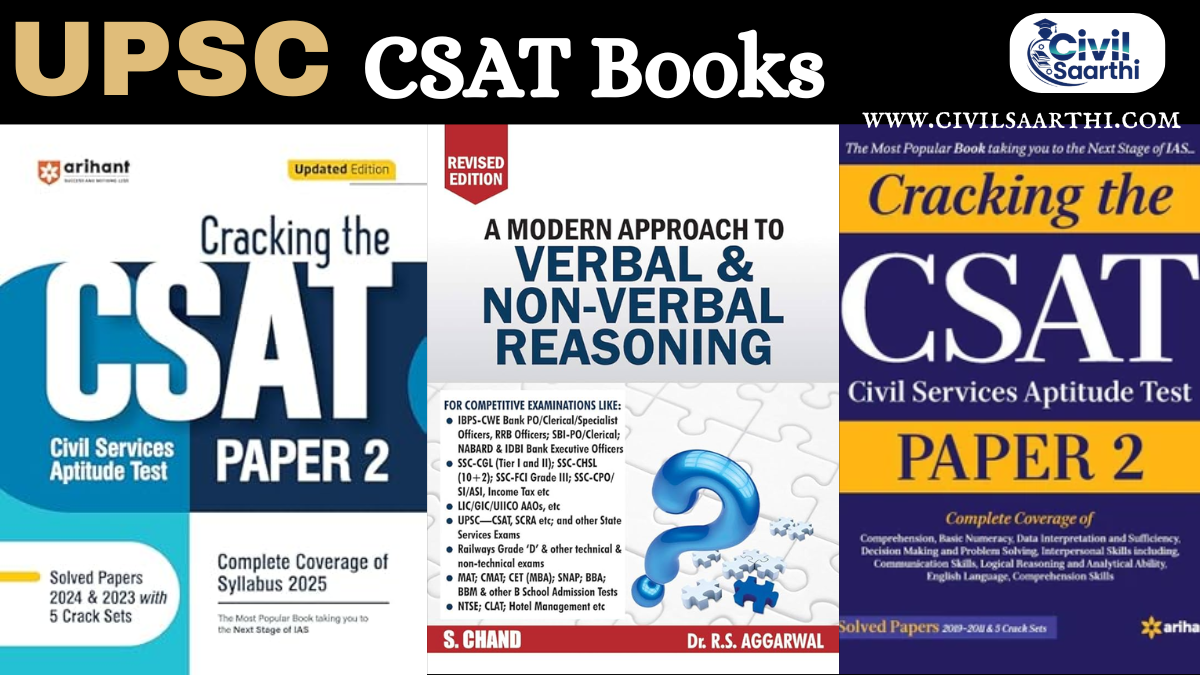Understanding of UPSC Books for Environment is essential for candidates aiming to succeed in the Prelims and Mains stages of the Civil Services Examination. This topic plays a crucial role not only in General Studies Paper III (Mains) but also in GS Paper I (Prelims), and sometimes in the Essay and Interview stages. Environment-related questions are becoming more dynamic and current-affairs-oriented, so a strong foundation in the UPSC Books for Environment is critical.
UPSC Books for Environment
The UPSC Books for Environment serve as the backbone for building both static and dynamic understanding of the ecological and environmental concerns relevant to the UPSC Syllabus. With increasing focus on sustainability, climate action, and biodiversity, every aspirant must refer to the correct set of UPSC Books for Environment to score well in both papers.
UPSC Books for Environment – Overview
Before diving into topic-wise resources, let’s go through a quick overview of the most important and recommended UPSC Books for Environment. These books are a blend of NCERTs, standard references, and current updates, ensuring complete coverage.
UPSC Books for Environment – Overview | ||
| Book Name | Author/Source | Purpose |
| Environment by Shankar IAS | Shankar IAS Academy | Comprehensive static theory |
| Environment and Ecology – GS Manual | TMH/Other Publication | Quick revision and facts |
| NCERT Class 12 Biology (Relevant Units) | NCERT | Basic concepts (Biodiversity, Ecology) |
| India Year Book (Environment Chapter) | Government of India | Official data and schemes |
| Down to Earth Magazine/Website | Centre for Science & Env. | Environment current affairs |
| PIB, MoEF Reports | Official Government Sites | Dynamic updates and new initiatives |
UPSC Books for Environment – Static Portion
The static portion includes basic principles of ecology, biodiversity, conservation, and pollution. For a strong base, candidates should rely on standard UPSC Books for Environment that cover these subjects in detail with diagrams and factual accuracy.
UPSC Books for Environment – Static Portion | |
| Topic | Recommended UPSC Books for Environment |
| Ecology and Ecosystem | NCERT Class 12 Biology (Chapters 13-16), Shankar IAS |
| Biodiversity | Shankar IAS, NCERTs, India Year Book |
| Environmental Pollution | TMH GS Manual, Shankar IAS |
| Climate Change Basics | NCERT, Shankar IAS, NIOS Study Material |
| Conservation Efforts | India Year Book, MoEF Reports, Shankar IAS |
UPSC Books for Environment – Dynamic Portion
Dynamic sections require knowledge of real-time developments, global summits, government initiatives, and environmental reports. The UPSC Books for Environment must be supplemented with updated current affairs sources to remain aligned with exam trends.
UPSC Books for Environment – Dynamic Portion | |
| Topic | Recommended UPSC Books for Environment |
| UN Climate Summits (COP, IPCC) | Down to Earth, PIB, MoEF Website |
| Government Schemes (like CAMPA) | India Year Book, PIB, MoEF Annual Reports |
| Environmental Agreements | Hindu Editorials, Shankar IAS Current Affairs Section |
| Wildlife Conservation Updates | ENVIS Centre, Down to Earth |
| Green Technologies & Innovations | Yojana Magazine, Science Reporter, PIB |
UPSC Books for Environment – Topic Wise Resources
Each subtopic in the environment section requires focused attention and can be studied better through customized UPSC Books for Environment designed for that subject.
UPSC Books for Environment – Topic Wise Resources | |
| Environment Topic | Recommended UPSC Books for Environment |
| Basics of Ecology & Ecosystem | NCERT Class 12 Biology Chapters 13-16, Shankar IAS Book on Environment, NIOS Environment Notes |
| Biodiversity and Conservation | Shankar IAS Environment Book, India Year Book (Biodiversity Chapter), NCERT, MoEF Reports, ENVIS Centre |
| Environmental Pollution | TMH GS Manual (Environment Section), Shankar IAS Environment Book, India Year Book |
| Environmental Acts and Policies | Shankar IAS Environment Book, India Year Book, Official MoEF Website, PIB Reports |
| Climate Change and Global Summits | Down to Earth Magazine, UNFCCC Website, PIB, Shankar IAS (Climate Change Chapter), Yojana Magazine |
| Conservation Projects (Tiger, Rhino) | MoEF Annual Reports, India Year Book, ENVIS Reports, Shankar IAS Book on Environment |
| Indian and International Agreements | UN Reports, Hindu Editorials, India Year Book, PIB Environment Briefs, Shankar IAS Environment Book |
| Green Technology and Sustainable Dev. | Yojana Magazine, Science Reporter, India Year Book, Official Government Portals, Shankar IAS Book |
| Environmental Current Affairs | The Hindu (Environment Section), Down to Earth Magazine, PIB, MoEF Website, Science Reporter |
UPSC Books for Environment FAQs
Which are the best UPSC Books for Environment for Prelims?
The best UPSC Books for Environment for Prelims include Shankar IAS Environment, NCERT Class 12 Biology, and India Year Book’s Environment chapter.
Are NCERTs enough in UPSC Books for Environment preparation?
NCERTs are good for building basics in UPSC Books for Environment, but must be supplemented with advanced sources like Shankar IAS and current affairs.
What is the role of current affairs in UPSC Books for Environment preparation?
Current affairs form a crucial part of UPSC Books for Environment because many questions in Prelims and Mains relate to recent environmental events.
Do I need to read India Year Book for UPSC Books for Environment?
Yes, the India Year Book is highly recommended in UPSC Books for Environment for its official and updated data on environment policies.
Is Shankar IAS enough as a single UPSC Books for Environment source?
While Shankar IAS is comprehensive, it should be combined with current affairs and government reports for complete UPSC Books for Environment coverage.
Which magazines help with UPSC Books for Environment preparation?
Down to Earth, Yojana, and Science Reporter are great supplementary sources for UPSC Books for Environment preparation.
How to revise UPSC Books for Environment effectively?
Create short notes from UPSC Books for Environment, make mind maps for static content, and revise weekly using PYQs and mock tests.





